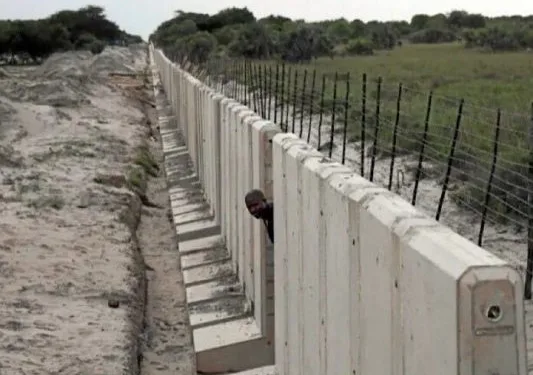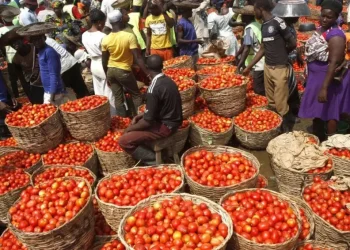South Africa is currently constructing a concrete wall along a segment of the South Africa-Mozambique border to prevent people from crossing over to steal, illegal immigration, and smuggling vehicles.
This strategic development came up as a response to the escalating incidents of vehicle theft and smuggling, which have long plagued the region.
This project valued at around $2.7 million, unfolds in a meticulously planned three-phase structure, each segment strategically designed to enhance connectivity and conservation efforts in the region.
Also Read: Mo Abudu Wins Forbes’ Bizwoman of The Year
Here’s How The South African Border Project Will Run
The initial phase, covering an 8-kilometre expanse bordering the illustrious Tembe Elephant Park, marks the initial step towards realizing the broader vision.
Following this, the project seamlessly transitions into the second phase, extending an additional 8 kilometers proximate to the renowned iSimangaliso Wetland Park, a critical ecological sanctuary.
The subsequent phase, constituting a 9-kilometre span from the western perimeter of Tembe Elephant Park to the majestic Pongolo River, represents the culmination of the endeavor.
The project was divided into different phases not only to ensure a systematic and efficient implementation process but also to underscore the project’s comprehensive scope and its multifaceted impact on biodiversity conservation, tourism, and regional development.
Through meticulous planning and strategic execution, the initiative aims to foster sustainable growth while preserving the natural heritage of the surrounding landscapes.
South Africa’s decision to build a concrete wall stemmed from a recent incident where citizens from neighboring countries attempted to breach it using a stolen SUV and iron ladders.
Also Read: Senegal Now Has Election Date after Protests
However, their efforts were thwarted as the iron ladders collapsed under the weight of the vehicle. Faced with failure, the perpetrators resorted to desperate measures, setting the SUV ablaze in an attempt to erase any incriminating evidence.
The South African National Defence Force (SANDF) champions the project with 15 companies of troops deployed to safeguard the nation’s borders, especially the high-risk frontiers adjoining Mozambique, Zimbabwe, and Lesotho.
Construction efforts at the Tembe Elephant Park section are currently in progress, marking a significant development reported jointly by the South African government and the KwaZulu-Natal province.
The initial stage of the project has received favourable responses from both local communities and the South African National Defence Force (SANDF).
Following notable delays, the KwaZulu-Natal Provincial Government has resumed the construction of the concrete barrier wall.
In a collaborative effort between the KwaZulu-Natal Department of Roads and Transport and the national Department of Public Works and Infrastructure, a budget of R50 million was allocated in late 2020 for the manufacturing and installation of concrete barrier units along the border.
An updated report presented to the Committee on Defence and Military Veterans revealed significant progress. Over 5 kilometers of the border wall has already been completed in the uMkhanyakude District Municipality in northern KZN.
The New Jersey barriers are strategically placed at locations identified by SANDF soldiers as high-traffic areas for vehicle thieves.
This measure is expected to significantly prevent illicit cross-border movement and contribute to the region’s overall security and stability.
South Africa’s drive to curb illegal immigration from neighboring countries is a commendable effort that improves security in the estate and brings about stability in the areas close to the borders and ultimately the country.
The concrete border project started as early as 2020 and South Africa has completed the first phase of the project. The initial stage started in May 2019 with a completion date of May 2020. The arrival of COVID-19 and the national state of disaster delayed the process and completion has been extended to November.










